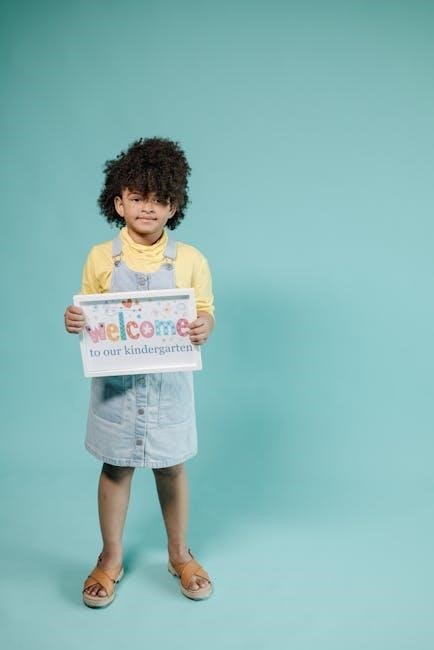kindergarten end of year assessment pdf free
Kindergarten end-of-year assessments evaluate students’ skills, offering insights into their academic and developmental progress. These tools, often available as free PDFs, help teachers plan future instruction effectively.
Importance of End-of-Year Assessments in Kindergarten
End-of-year assessments in kindergarten are crucial for evaluating students’ skills and developmental progress. They provide insights into academic readiness, social-emotional growth, and physical development. These assessments help teachers identify strengths and areas needing support, ensuring personalized instruction. Additionally, they allow educators to track progress over time and communicate achievements to parents. Free PDF resources make these tools accessible, offering structured formats for consistent evaluation. By aligning assessments with learning goals, teachers can better understand student needs and plan future instruction effectively, fostering a strong foundation for lifelong learning. These assessments are essential for guiding educational strategies and supporting student success.
Overview of Assessment Goals and Objectives
The primary goals of kindergarten end-of-year assessments are to evaluate students’ mastery of foundational skills and identify their readiness for first grade. Objectives include measuring literacy, numeracy, social-emotional development, and physical abilities. Assessments aim to provide a comprehensive understanding of each child’s progress, ensuring they meet developmental milestones. They also help teachers reflect on instructional effectiveness and inform future planning. Free PDF resources often structure these assessments to align with curriculum standards, offering clear and measurable criteria. By focusing on key areas, these tools support holistic child development and prepare students for continued academic success in subsequent grades.

Types of End-of-Year Assessments for Kindergarten
Kindergarten end-of-year assessments include formative, summative, and developmental tools. These may involve standardized tests, observation checklists, and portfolio reviews. Free PDF templates are widely available online.
Formative vs. Summative Assessments
Formative assessments are ongoing evaluations used to monitor student progress throughout the year. They provide immediate feedback, helping teachers adjust instruction. Summative assessments, like end-of-year tests, measure mastery of skills at the end of a period. Both are essential for understanding student growth. Formative tools include observations and quizzes, while summative assessments may involve standardized tests or projects. Free PDF templates for both types are available online, offering structured ways to track development and final outcomes in kindergarten. These resources help educators ensure comprehensive evaluation of young learners’ skills and readiness for future grades.
Developmental Checklists and Observation Tools
Developmental checklists and observation tools are crucial for assessing kindergarten students’ growth. These resources, often available as free PDFs, help teachers track milestones in literacy, numeracy, and social-emotional development. Checklists provide structured frameworks to monitor progress, while observation tools capture daily behaviors and skills. They offer insights into students’ problem-solving abilities, creativity, and interaction with peers. Many free PDF templates include space for notes and ratings, making it easy to document and share progress with parents. These tools are invaluable for understanding each child’s unique development and planning supportive instruction tailored to their needs.
Free PDF Resources for Kindergarten Assessments
Free PDF resources for kindergarten assessments provide convenient tools for evaluating student progress. These downloadable templates include checklists, observation forms, and skill trackers, supporting comprehensive end-of-year evaluations.
Popular Websites and Platforms Offering Free Assessment Templates
Several websites provide free PDF templates for kindergarten assessments, such as Teachers Pay Teachers, Education.com, and PBS LearningMedia. These platforms offer customizable tools like developmental checklists, observation forms, and skill trackers. Renaissance Learning and Google Classroom also feature resources for evaluating early childhood development. Additionally, Canva and ScribbleMaps provide creative templates for visual assessments. These platforms are widely used by educators to streamline the evaluation process and ensure comprehensive end-of-year assessments. They often include alignment with curriculum standards, making them versatile for various educational settings.
How to Create Your Own Assessment Tools Using Free PDF Formats
Creating custom kindergarten assessment tools using free PDF formats is straightforward. Start by identifying learning objectives and skills to evaluate. Use tools like Google Docs or Canva to design templates. Incorporate visuals, simple language, and interactive elements to engage young learners. Include sections for observation notes, skill checklists, and developmental milestones. Ensure templates are editable and aligned with curriculum standards. Save as PDF for easy sharing and printing. Customize fonts, colors, and layouts to suit your classroom needs. Test the tool with a small group before full implementation. This approach allows personalized, effective, and efficient end-of-year assessments tailored to your students’ needs.

Key Skills Assessed at the End of Kindergarten
Key skills include literacy, numeracy, social-emotional development, and physical abilities. Assessments evaluate readiness for first grade, focusing on foundational knowledge and developmental milestones achieved during the year.
Literacy and Numeracy Skills
Literacy and numeracy skills are foundational for kindergarten assessments. Students are evaluated on phonological awareness, alphabet recognition, and basic sight words. In numeracy, they demonstrate understanding of numbers, shapes, and simple arithmetic. Assessments often include recognizing patterns, counting up to 100, and basic addition/subtraction concepts. These skills are assessed through interactive activities, worksheets, and oral responses. Free PDF resources provide structured tools to measure progress, ensuring alignment with educational standards. These assessments help identify readiness for first grade and highlight areas for further support, bridging the gap between kindergarten and elementary education effectively.
Social-Emotional and Physical Development
Social-emotional and physical development are crucial in kindergarten assessments. Students are evaluated on cooperation, empathy, and self-regulation skills. Physical development includes fine motor abilities, such as using scissors or writing tools, and gross motor skills like running or jumping. Assessments may involve observational checklists and hands-on activities. Free PDF resources provide frameworks to track progress in these areas, offering insights into students’ overall growth. These tools help teachers identify strengths and areas needing support, ensuring a well-rounded approach to early childhood education and preparing students for future social and academic challenges effectively.
Best Practices for Administering Assessments
Creating a supportive environment and using engaging tools are key. Ensure assessments are age-appropriate and aligned with learning objectives to provide accurate insights into student progress effectively.
Creating a Supportive Environment for Assessment
Creating a supportive environment for kindergarten assessments ensures students feel comfortable and confident. Use familiar materials, minimize distractions, and maintain a positive tone to reduce anxiety. Incorporate visual aids and clear instructions to guide young learners. Positive reinforcement, such as praise, encourages engagement and effort. Ensure activities are age-appropriate and aligned with their developmental stage. Allow for movement breaks and incorporate play-based assessments to keep students focused and motivated. A supportive environment fosters a love for learning and helps teachers gather accurate insights into each child’s abilities and progress.
Differentiated Instruction and Inclusive Assessment Practices
Differentiated instruction and inclusive assessment practices ensure all kindergarten students, regardless of abilities, can demonstrate their learning effectively. Use varied teaching strategies, such as visual, auditory, and kinesthetic approaches, to cater to diverse learning styles. Incorporate assistive technologies and adaptive tools to support students with special needs. Provide multiple ways for students to express their understanding, such as through art, verbal responses, or hands-on activities. Ensure assessments are culturally responsive and free from bias. By tailoring instruction and assessments, teachers create an inclusive environment that values individual differences and promotes equitable learning opportunities for all students.

Interpreting and Using Assessment Results
Interpreting assessment results helps identify student progress and skill mastery, guiding teachers to tailor instruction and communicate effectively with parents about their child’s development and needs.
Understanding Growth and Developmental Milestones
Kindergarten end-of-year assessments are designed to evaluate students’ progress toward key developmental milestones, including social-emotional, cognitive, and physical skills. By aligning assessments with established milestones, educators can identify areas where students may need additional support. These milestones often include literacy and numeracy skills, such as recognizing letters, counting, and basic problem-solving. Social-emotional development, like sharing, cooperation, and self-regulation, is also a critical focus. Free PDF resources provide structured tools to monitor progress, ensuring a comprehensive understanding of each child’s growth. This data helps teachers and parents collaborate to create targeted strategies for future learning and development. Accurate assessment ensures every child receives the support they need to thrive.
Communicating Results to Parents and Stakeholders
Effectively sharing assessment results with parents and stakeholders is crucial for fostering collaboration and supporting student growth. Teachers should provide clear, concise reports that highlight strengths and areas for improvement. Visual aids, such as charts or graphs, can help illustrate progress. Parents should receive actionable recommendations to support their child’s continued development. Schools can also offer resources, like free PDF guides, to help parents understand assessment results. Open communication channels, such as parent-teacher conferences or written summaries, ensure transparency and encourage partnership between educators and families. This collaborative approach ensures everyone works together to support the child’s educational journey. Regular updates build trust and engagement.

Kindergarten end-of-year assessments provide valuable insights, guiding future instruction and development. Utilize free PDF resources to support continuous learning and explore professional development opportunities for educators to enhance assessment practices.
Using Assessment Data to Inform Future Instruction
End-of-year assessment data provides educators with actionable insights to tailor instruction for upcoming years. By analyzing strengths and areas needing improvement, teachers can adjust lesson plans to address specific skills, such as literacy or numeracy gaps. Free PDF resources, like developmental checklists, offer structured tools to track progress and inform differentiated instruction. This data-driven approach ensures personalized learning experiences, fostering student growth. Additionally, sharing results with colleagues and families promotes collaborative goal-setting. Leveraging assessment outcomes effectively prepares students for future academic challenges and supports a cohesive, skills-focused curriculum design.
Resources for Further Professional Development
Teachers can enhance their assessment skills through various professional development resources. Websites offering free PDF templates provide practical tools for designing assessments. Online courses and webinars focus on differentiated instruction and data interpretation. Professional learning communities and educational forums share best practices for kindergarten assessments. Additionally, organizations like the National School Reform Faculty offer protocols for effective assessment strategies. These resources empower educators to refine their methods, ensuring they align with developmental milestones and student needs. By engaging in continuous learning, teachers can create more impactful and inclusive assessment practices, benefiting both their students and instructional approaches.
